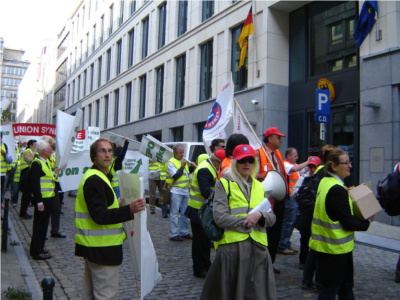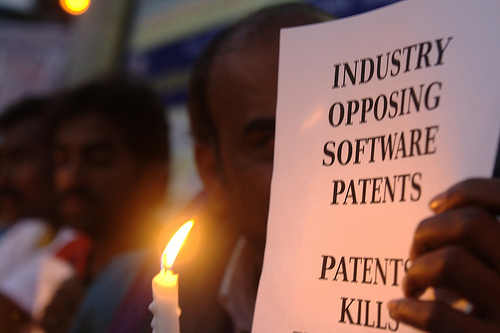
Rocky Affairs
I HAVE JUST returned after 4 days away, so here is a summary of some events worth noting now that 'The System' is facing an unprecedented shakedown.
First and foremost, people's prediction or observation that the patent system is a ticking bomb for its exaggerated valuation of imaginary property -- much like mortgages -- is already a reality. Several months ago, one reader warned that the likes of Nathan Myhrvold (Microsoft's
adjunct patent troll) cared not for their deadly impact on the economy but only for themselves. A year ago it was also predicted
that this type of bubble would burst sooner or later.
Will the patent system trigger financial collapse in 2008?
This was the title of an article written one year ago. Here is the end, which is happening nowadays: "What does this mean for the patent system? David Martin points out that three separate bubbles are about to pop at the same time: consumer debt, mortgage debt, and patent debt. Each of these bubbles will cause enormous damage to those institutions who were over-committed, and most certainly to those who helped create the bubble. The patent offices will not go unrewarded for helping to create another Great Depression, by printing trillions of Euro worth of funny money."
As the photo at the top reminds critics of the system, patents have already 'blown up' in Europe where staff of the patent office have
taken it to the streets. Here is another article about it, going back to the end of last week.
Around 250 staff took part in the strike and a march through Brussels demanding better governance of the EPO, according to the EPO staff union, SUEPO. A delegation met with officials from European Internal Markets Commissioner Charlie McCreevy's office the next day to outline their concerns.
Found in
Digital Majority, here is the EFF's statement suggesting that the
Department of Justice opposes the IP Enforcement Bill.
the Department of Justice has limited resources to dedicate to particular issues, and civil enforcement actions would occur at the expense of criminal actions, which only the Department of Justice may bring. In an era of fiscal responsibility, the resources of the Department of Justice should be used for the public benefit, not on behalf of particular industries that can avail themselves of the existing civil enforcement provisions.
That's the same
Department of Justice which bailed out Microsoft several times before. It's part of a dysfunctional regulatory system that comes under fire right now for failing to react early enough to what had become a crisis, never mind preventing it. It includes the SEC, which is at the firing line at the moment having
failed to spot misconduct at Novell and many other such companies (including SCO). The head of the SEC, who can be seen
in this video, might be ousted by McCain shall the Republican candidate be elected, according to yesterday's issue of the Wall Street Journal, which had a very critical article about the SEC. Novell, for its part, sank below $5
again.
Microsoft Part of the Problem
Microsoft's patents strategy shows no signs of abatement or slowing down. Last week the company
earned 52 patents in the United States, giving itself the illusion of progress (on paper only).
52 US patent applications published on 25 September 2008 and assigned to Microsoft
Microsoft also managed to sneak out of the
deadly patent trial with Alcatel-Lucent. It's the same trial where Microsoft actually
argued against software patents.
Microsoft is celebrating victory at the Court of Appeals for the Federal Circuit in its dispute with Alcatel-Lucent over two MP3 patents. According to US media sources, the company will not have to pay its rival the $1.53 billion in compensation demanded. The appeal court upheld the August 2007 District Court decision, which overturned the decision of the jury in the original trial in February 2007. Alcatel-Lucent had filed an objection to this verdict.
Summary of coverages can be found
here. It's a victory not just to Microsoft but also to those who loathe software patents (not Microsoft).
Here is another
very recent discussion on what can and cannot be patented.
Computer programs, mathematical methods, discoveries, schemes, rules or methods for performing mental acts and methods for presentation of information are excluded from patentability to the extent that they do not have an impact in the real world. In effect for software, the computer program cannot be claimed on its own - there must be a ‘technical effect’. The program must facilitate some other process, rather than embody the process itself.
India to Stay on the Safe Side
Indians are still fighting to maintain (or restore) some sanity in their system [
1,
2,
3,
4,
5,
6,
7,
8,
9,
10,
11,
12,
13,
14,
15]. They have many reasons not to mimic the system from the far west, especially now that it's breaking apart. An event is
being organised and some readers might be able to attend or to help.
Several organisations in Bangalore are organising a meeting to discuss the dubious plans of the Indian Patent Office to adopt the same infamous 'technical effect' doctrine of the EPO. The Indian patent law is a copy/paste from the European Patent Convention, containing the 'as such' provision. The Patent Office said it would organise a public meeting, but it seems that organisations prefer to organise their own meeting.
Appended below is the announcement sent to us by the organisers of the event.
⬆
____
On behalf of the organizers,
Free Software Users Group- Bangalore
cordially invites you to
The National Public Meeting on Software Patents
====================================
==Venue==
2nd Floor, Ecumenical Resource Centre,
United Theological College,
Millers Road, Benson Town.
(Behind Cantonment Railway Station)
Bangalore–560046
==Time==
10:00–17:00
Saturday, October 4, 2008
Software patents in India occupy a contentious and indeterminate legal
space. While recent amendments to the Patent Act have sought to bring
our law in conformity with WTO-mandated standards, these amendments have
shied from pronouncing conclusively on the patentability of software.
The result is an equivocation in the law which is being wrestled
aggressively and effectively by corporate interests, patent attorneys
and the Patent Office in favour of granting software patents. Unheard,
and so unrepresented in this powerful triad are the interests of
millions of citizen-consumers who are either presumed too ignorant to be
credited with a view on the issue, or are presumed to be irrelevant to
the determination of issues which are seen as purely "business" matters
(as opposed to "citizen" matters).
Software is everywhere you look (and many places you never think
of looking). With the explosion of low-cost computing devices (think
mobile phones and iPods), software has leaked out of its traditional
home—the PC—and begun infiltrating various aspects of our lives. From
traffic signals to toilet commodes in some countries, refrigerators to
railway tickets, vacuum cleaners and electronic voting machines, TVs,
refrigerators and electronic pacemakers, inanimate objects of all sizes
are humming to themselves, chattering amongst themselves in an
intricate, highly complex tongue called 'software' that few of us can
ever hope to understand. On the impulses of software, we stop or move on
streets, fill up on petrol, and elect governments. Someone's heart
beats. Someone else receives land records on a village kiosk. Someone is
standing by helplessly for fourteen years (the un-evergreened term of a
patent) because software failed to factor in her disability.
There are big stakes involved in the control of software in an era
when software is becoming increasingly central to the way we humans
organize our lives and inhabit a democracy. At one level this is about
preserving the right of agency and self-direction that citizens have in
their own lives. At another, it is about the right not to be silenced
when our long-fought democratic republic is at risk of being diminished
by a few lines of software in a machine. Whether or not we are all in
fact capable of deciphering software is inessential. Those of us who are
ought not to be denied the freedom to interrogate, tinker and improve.
Patents have the effect of adding an additional layer of 'protection'
to already existing copyright protection of software, while
simultaneously overriding the various affordances and safeguards built
into copyright law. For instance, the right of "fair dealing" under
copyright law permits users to examine and modify any software in order
to make it interoperable with other software. This is an extremely
potent right that reasserts our right to intervene in the shaping of our
surroundings. It is also one of the rights that is most imperiled by
software patents.
The present "public hearing" on software patents is an invitation
for dialogue on the various issue surrounding software patents.
Although the Patent Office had scheduled a public consultation on its
Draft Patent Manual to be held in Bangalore in August this year, that
meeting was abruptly cancelled (or postponed indefinitely, or to an
unannounced date—we can't be sure) without any reasons having been
assigned by the Patent Office. This signals either of two unpleasant
scenarios: first, the Patent Office is proceeding with its consultations
in an extremely mechanical fashion, not intending inputs received in the
course of these consultations to qualitatively impact their functioning
in any way; or secondly, perhaps the Patent Office underestimates the
amount that citizens living in the IT capital of India might have to say
on the subject of software patents.
It is our attempt in this public hearing to organize the kind of
consultation that the Indian Patent Office ought to have conducted. We
hope also hereby, to serve as a gentle but firm reminder to the Patent
Office that its task is as yet undone.
==Agenda==
1000–1100
Presentation on the principles of patent law and
software patents
Sudhir Krishnaswamy
(National Law School)
Prabir Purkayastha
(Delhi Science Forum)
Nagarjuna G.
(Free Software Foundation of India)
1100–1130
Discussion on software patents in the Indian context:
Indian Patent Act, and the draft patent manual
Prashant Iyengar
(Alternative Law Forum)
Venkatesh Hariharan
(Red Hat)
1130–1150
Tea break
1150–1240
Discussion on patents and the development sector
(freedom of speech, open standards, healthcare, biotech, agro-sector,
etc.)
Sunil Abraham
(Centre for Internet and Society)
Anivar Aravind
(Movingrepublic, FSUG-Bangalore)
Others
1240–1300
Presentation on the software patents that have been
granted so far in India
Pranesh Prakash
(Centre for Internet and Society)
1300–1400
Lunch break
1400–1700
Open House
T. Ramakrishna
(National Law School)
Abhas Abhinav
(DeepRoot Linux)
Joseph Mathew
(Special It advisor, Govt of Kerala)
Sreekanth S. Rameshaiah
(Mahiti Infotech)
Vinay Sreenivasa
(IT for Change)
Any others who wish to speak
==Organizers==
Centre for Internet and Society; Free Software Users Group-Bangalore;
Free Software Foundation of India; SPACE; IT for Change; Alternative
Law Forum; Delhi Science Forum; Movingrepublic; Sarai/CSDS; OpenSpace,
; Swathanthra Malayalam Computing; Servelots - Janastu; Mahiti; DeepRoot
Linux; Wiki Ocean; Turtle Linux Lab; Zyxware Technologies; INSAF; Aneka

